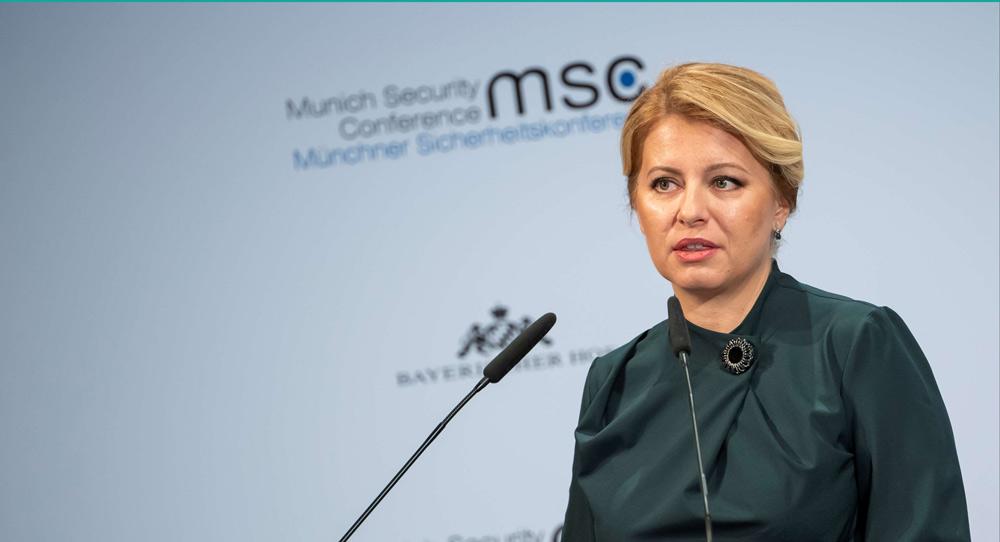Carnegie Europe is on the ground at the 2020 Munich Security Conference, offering readers exclusive access to the debates as they unfold and providing insights on today’s threats to international peace and stability.
***
The contrast between Zuzana Čaputová, president of Slovakia, and Emmanuel Macron, president of France, couldn’t be starker.
When Čaputová took to the podium on Sunday to open the last day of the Munich Security Conference (MSC), she gave an unjaundiced analysis of what was taking place in her part of Europe. She dwelt on the absolute necessity to defend the rule of law. It is the bedrock of the West.
Macron, who spoke the previous day, dwelt on how Europe had to become more economically and politically integrated while developing a strong and credible defense and foreign policy. It had to become more sovereign.
Here were two competing views of Europe.
One from a youngish member of the EU and NATO—Slovakia joined both in 2004—that had to shake off decades of communist rule. The other, a founding member of the EU whose French Revolution of 1789 had a profound impact on the Continent’s politics.Čaputová and Macron were both grappling, from different perspectives, with how to deal with Europe’s incomplete transformation. Macron’s view was a Europe that needed strategic ambition. Čaputová’s view was a Europe that had to protect and practice its values.
Čaputová, a lawyer who took office in June 2019 after running a campaign based on ending corruption and strengthening the rule of law in her country, pulled no punches.
She dwelt briefly on the legacy of the communist past and the difficulties in completing her country’s transformation. And she implicitly and rightly, but without any sense of bitterness, questioned if “old” Western Europe really understood her part of Europe.
“We grasped democracy, progress, or reforms over the past thirty years in a rather technical way,” she explained. “Economic growth expressed in numbers. Reforms translated into a number of new institutions. A set of criteria to be fulfilled.”
In other words, implementation of these criteria was not coupled with deepening a democratic culture and strengthening the institutions of accountability.
And along this road to the return to Europe and the West—and it was a very long and turbulent one for Slovakia because of the appalling corruption, the political mafias, and the immense pressure on the media—Slovakia and other countries in the region lost sight of the meaning of democracy.
The participation of Ludovic Orban, prime minister of Romania, on the subsequent panel—“Eurovision Contest: A Europe that Protects”—was poignant. Over the past three decades, Romania has been metaphorically ravaged by corruption, a judicial system lacking independence, and a rule of law that exists only on paper.
It’s as “if we have forgotten that democracy—and, may I say, Europe and the West as such—are mainly about the spirit of freedom, of justice, tolerance, and solidarity,” Čaputová said.
“These are bound together by the rule of law. That democracy is about everyday respect and observances of rules, not about bypassing them. Simply put, it is about responsibility.”
This matters for the citizens of this part of Europe. Without civil society, Čaputová would not have been elected. In Hungary and Poland, civil society is trying, with little success so far, to curb the insatiable appetite of the governing parties to weaken the rule of law and the independence of the judiciary and the media.
So, for all this talk about “Westlessness,” Čaputová was clear. “We are a community of values whose strength originates from our ability to live by these values and to defend them,” she said.
“We cannot do so without the rule of law, which in turn, requires strong institutions and active citizens. But it also requires political leaders who abide by the rule of law themselves and protect it. If we, political leaders, resign on this duty and responsibility, a Europe that protects will cease to exist.”
The short speech later in the morning by Stevo Pendarovski, president of North Macedonia, confirmed how the power of civil society and citizens successfully overturned many years of misrule and corruption. His country is desperate to join the EU, which Macron blocked on the ground that the EU first had to decide its future direction (he mellowed his stance a little in Munich).
The contrasts between these two Europes that were so clearly articulated in Munich were necessary to hear. They are not irreconcilable. This is because of Europe’s enduring attraction, which is its commitment to values such as individual freedom and the rule of law—despite how much these values are coming under pressure from many EU member states. And despite the lack of courage by many leaders to defend them.
Moreover, Europe’s wish and goal to have more global influence will, as German President Frank-Walter Steinmeier said during the MSC’s opening speech on Friday, require this commitment to integration, shared values, and the member states understanding each other.
That is “Westness.”
Photo credit: MSC/Müller





.jpg)
.jpg)

